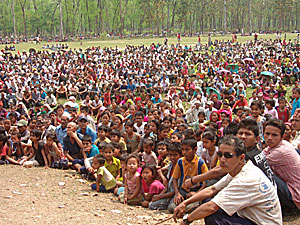 |
The food from relief agencies was never enough, water was scarce and she didn't have any warm clothes for the winter. What kept Dhana Maya going was the slim hope that she could see her homeland again before she dies.
That hope is not likely to be fulfilled. Instead, many of the 110,000 refugees here will be moving further away from Bhutan as they are resettled in third countries under an agreement brokered by the UN. After the process started in March, 7,297 refugees have already been sent to the US, Denmark, the Netherlands, Canada and Australia.
Human rights activists say that although resettlement addresses the immediate humanitarian needs of refugees, it lets the Bhutan regime get away with a deliberate process of ethnic cleansing. "The autocratic regime in Bhutan has never recognised us as citizens, and now everyone is washing their hands of us," says Chairman of the Human Rights Organization of Bhutan (HUROB) SB Subba.
However, there is growing support among younger refugees to opt for resettlement. They want to go to a new country to start over. Vice-chairman of the Bhutan Student Union Mukti Raj Gurung, who is also planning to relocate, says: "Our generation wants to belong somewhere, we don't want more uncertainty."
But there is also a fierce revolutionary streak gathering strength in the camps, and the anger is directed at the government that forced them out. More than 60 per cent of the Bhutan Communist Party-Marxist Leninist (Birat) consists of refugees aged less than 30. One supporter, Kalam, says resettlement just shifts the problem, adding: "To relocate the refugees is like rewarding the dictatorial regime in Bhutan." His party now has the avowed goal of overthrowing the Bhutan regime.
 |
The rise of the Maoists in Nepal has bolstered support among the revolutionary-minded refugees in the camps. Kalam is already thinking ahead, "We'll have an international group of Lhotsampas soon."
Radicals like Kalam's group have been accused of threatening those who want to leave. Conflict between those who want to relocate and those who don't is common, although less so than earlier this year.
In May, three people were killed in bombs planted by hardliners opposing the resettlement. The WFP, UNHCR and IOM warned that further attacks could force them to reassess assistance to the camps.
But as news from recently resettled filter back to the camps, the numbers of those opting to go is swelling. "In spite of the conflict and the problems involved, we plan to cross eight thousand before Christmas," says David Dethrik, who heads the relocation program of UNHCR.
Among those who have relocated this year, 7,010 have gone to the US, 393 to Australia, 129 to New Zealand, 17 to the Netherlands, 13 to Denmark and 19 to Norway. The number of refugees who've applied for relocation has exceeded 63,000, while 3,200 are waiting for flights out before the end of the year.
SEE ALSO:
Going nowhere - ISSUE #356 (06 JULY 2007 - 12 JULY 2007)
Lhotshampa chargesheet - ISSUE #238 (11 MARCH 2005 - 17 MARCH 2005)


